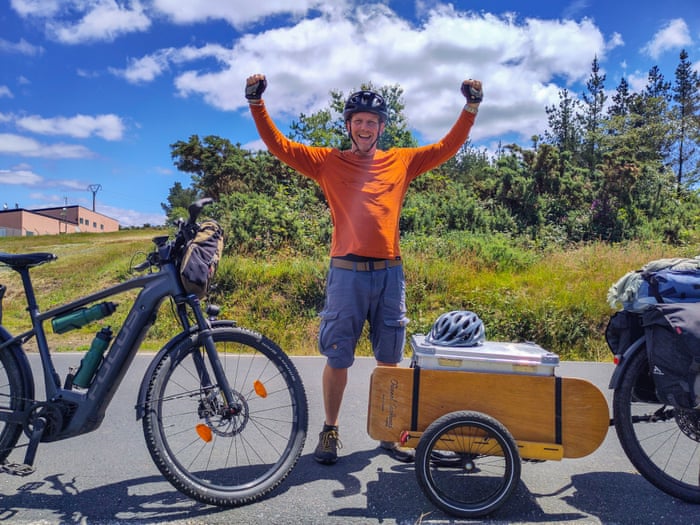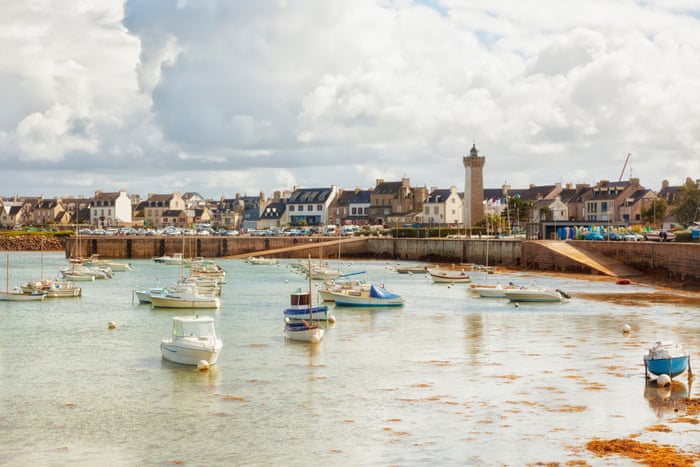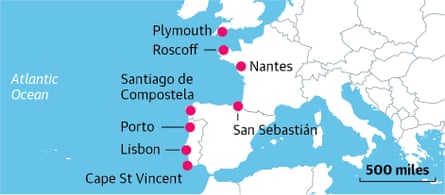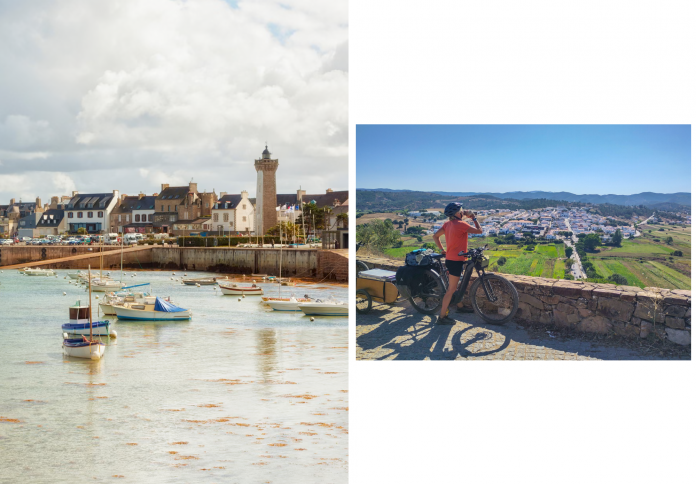At an age when many are settling comfortably into retirement, Martin (57) and his wife Lizzy (62) embarked on a monumental journey that redefined the meaning of slow travel. Trading the environmental impact and ‘faff’ of their campervan for the raw simplicity of two bicycles, the couple set out from their home in Cornwall to cycle over 2,000 miles to Cape St Vincent in Portugal. The grand ambition was to chase waves along Europe’s western coast, towing their entire lives—including two cumbersome wooden surfboards and a full camping kit—in trailers behind them. This unsupported, three-month odyssey was not just a physical endurance test, climbing over 20,000 metres in total; it was a philosophical experiment. They sought to discover if true freedom and happiness could be found by shedding modern conveniences and embracing the stark beauty and punishing simplicity of the open road, proving that the greatest adventures are often powered by nothing more than pedal strokes and sheer determination.
The Burden Of Freedom: A Quest For Less
The genesis of the 2,000-mile ride was born from a deep-seated disillusionment with contemporary life and the perceived freedom of van travel. Martin, weary of the ecological and logistical complexities that accompany a motor vehicle, craved a simpler, more connected way to explore the continent. The solution was the bicycle: a mode of transport that promised adventure with a minimal environmental footprint, forcing them to engage with their surroundings at a human pace.

For Martin, the initial excitement was deeply entwined with a private terror—a fear that his 57-year-old body might fail, or that his soul might not cope with the relentless daily effort. His wife Lizzy, 62, a veteran cyclist who had conquered the Andes in her twenties, approached the epic ride with a quiet, veteran confidence that served as the expedition’s emotional ballast. Their decision to rent out their house and lend out their van meant the commitment was total, removing the possibility of retreat and forcing them to confront the road and themselves in its entirety.
The Rig And The Routine: Logistics Of The Open Road
The technical setup for the journey was as challenging as the distance itself. This was an entirely unsupported trip, meaning every necessity—shelter, cooking gear, clothing, and two heavy wooden surfboards—had to be towed. Martin’s trailer carried the boards, tent, and wetsuits, while Lizzy’s hauled the rest of the camping kit, including two belly boards for lighter wave excursions. The physical demand of hauling this load quickly accumulated.

The daily routine was one of grinding effort and instant collapse. After approximately five hours in the saddle, the couple would stop around 6 pm, having often climbed significant daily elevations contributing to the staggering total ascent of over 20,000 metres—more than twice the height of Mount Everest. The evenings were strictly functional: pitching the tent (67 times in total), cooking a meal, and collapsing onto their blow-up beds. The occasional puncture provided a frustrating but necessary break from the rhythm, a small reminder that even a simple machine demands maintenance.
La Vélodyssée: A Gentle Start Through France
The initial leg of the journey was designed to ease the couple into the rhythm of long-distance, loaded cycle touring, following Europe’s established coastal infrastructure. After crossing to Roscoff, they immediately joined the Nantes-Brest canal for the first 190 miles, enjoying long, flat stretches that allowed them to find their “bimbled” pace. This phase of the journey was restorative, slowly building their fitness and confidence before the more challenging Iberian landscape.
Following the popular La Vélodyssée, an 800-mile, mostly off-road cycle route down the west coast of France toward the Spanish border town of Hendaye, they were immersed in a landscape of quiet paths and predictable logistics. This long stretch was a masterclass in simplicity, proving that minimal living did indeed foster a form of profound satisfaction. It created a routine so simple—pedal, eat, sleep, repeat—that it stripped away the mental clutter of their previous lives. The one moment of unexpected luxury—a spontaneous check-in to a hotel when a campsite failed to materialize—was an experience of “clean white sheets—heaven!” that only highlighted the comfortable deprivation of their usual tent life.
The Iberian Peninsula: Surf, Camino, And Ascent
As the couple crossed the border into Spain and Portugal, the landscape and the cultural experience shifted dramatically. The relatively flat cycling routes gave way to the sharp ascents that contributed to their enormous total elevation gain, demanding a deeper level of physical and mental resilience. This phase of the journey brought them closer to their primary goal: finding world-class surfing.

They found themselves tackling two legs of the revered Camino de Santiago, incorporating a spiritual and historical dimension into their coastal adventure. The cultural immersion of the Camino, with its ancient routes and fellow travelers, stood in stark contrast to the singular focus of their surfing quest. Crucially, their perseverance led them to hallowed surf spots, including the legendary barrels of Mundaka in Spain, the powerful waves around Peniche, and the protected waters of the World Surfing Reserve at Ericeira in Portugal. These brief moments of finding perfect waves, earned through weeks of hard cycling, were the ultimate physical and emotional rewards, symbolizing the profound connection between effort and enjoyment.
Cape St Vincent: The South-Westerly Summit
The final destination was Cape St Vincent, the south-westerly tip of Europe, a symbolic finish line that represented not just a physical achievement, but a successful culmination of their philosophical experiment. Reaching the end of the 2,000-mile route, after three months of intense, daily effort, was the ultimate confirmation of their ability to adapt and endure.
The journey was proof that life’s greatest rewards often require the most significant investment of time and personal energy. By choosing two wheels over four, camping over commercial accommodation, and simple living over consumer complexity, the couple found the freedom and profound happiness they had been searching for. Their trip from Cornwall to Portugal—surfboards in tow—was a resounding testament to the power of commitment and the joy of embracing a life with less, ultimately proving that true adventure is accessible at any age, provided one is willing to haul the weight.










